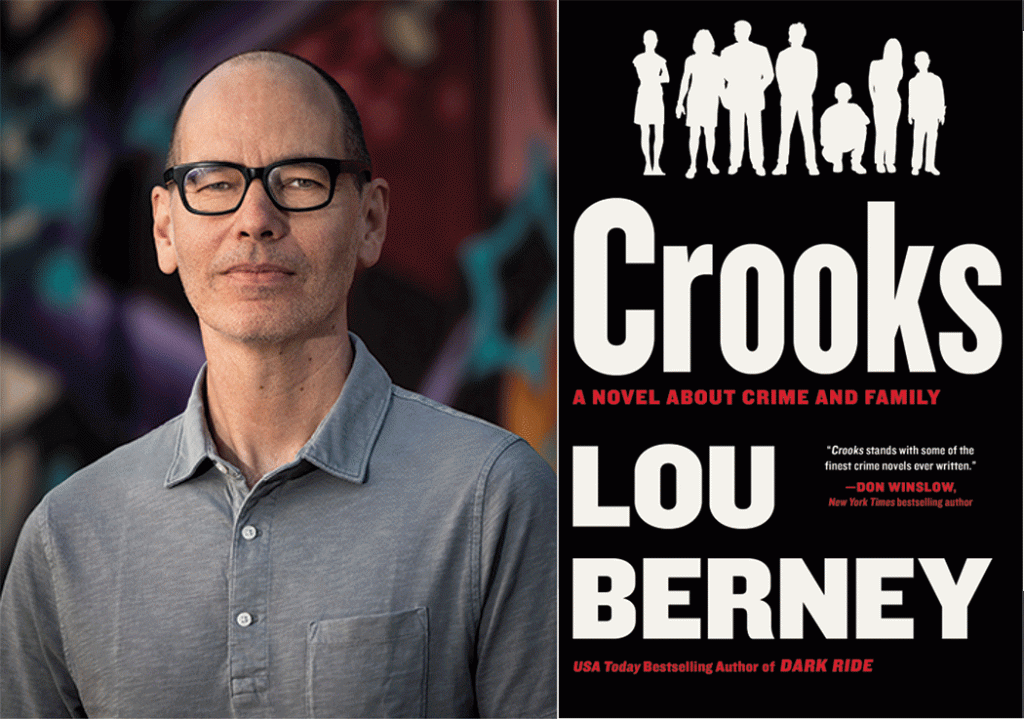
Crime is the family business for the Mercurios in Lou Berney’s new novel, Crooks. The book starts with an origin story—how Buddy and Lillian found each other, fell in love, got married, and, ultimately, tried to double cross one another—and then follows each of their five children one at time. The episodic narrative follows the family through four decades of choices—good, bad, morally gray—and explores the ways in which the characters are (and are not) products of their unusual upbringing.
The book opens with a stark declaration that crime is in Buddy Mercurio’s blood, but Berney also introduces an adopted child, Tallulah, subtly adding a “nature versus nurture” element to his tale.
The family’s various stories are told in a relentless present tense, but the passage of time is equally central to the novel. That is not an easy combination to pull off, but Berney makes it seem effortless.
The author of a number of previous novels, Berney teaches at Oklahoma City University. He answered questions via email.
One of the members of your titular cast is a fiction writer casting about for a story to tell. How did this story—these stories, really—come to you?
Thank you for assuming I don’t have any real-life criminals in my family—(I don’t, as far as I know! ). This book came about because I’ve always been interested in siblings, in how that dynamic can be such a powerful influence in an individual’s evolution. I have two older sisters and sometimes I’m shocked to realize how much I’ve been shaped by them and our relationships. Family is family—you never outgrow it.
I’m interested in the structure of the book. Each section “stars” a different member of the family, and with each section we move forward in time. Was that the plan from the start, or did this path through the story develop as you worked on the book?
That was the plan from the start. I love all the various subgenres of crime fiction, and I was jazzed about writing a book that roamed across a few of them. It seemed like a perfect fit for a family novel, where each character is alike—but also different.
It seems to me that you have interwoven at least three themes: the nature of a family and one’s necessary responsibilities and burdens; the nature of the hustle and crime as part of American culture (even as Tallulah’s story is set in Moscow); and the impact and vagaries of time as it passes. To what degree were you thinking of these themes as you wrote?
I try not to think too much about theme as I write, since I like it best when it emerges organically from plot and character, but I guess I did always have in mind that struggle we all go through: How much of our past, in this case family influence, do we keep and how much do we toss aside as we move through life? How much can we toss aside?
For all that English-major talk of themes (sorry), this book is character and action driven. The characters are vibrant, varied, and believable. Some of them (maybe nearly all of them) might be antiheroes of a sort, but they are also easy to root for. I wonder how you think about character creation—both in the case of these particular characters but also more generally in your work.
Thank you! I try to start with a very sharp, clear, simple idea of a character (e.g., Jeremy is a golden boy) and then let them get as messy or complicated as they want. Writing from the inside out is important to me; I want to see the world the way my characters do.
I was looking over the list of authors you admire (LouBerney.com/bio), and—as a reviewer based in the Iowa City area—I was delighted to see Flannery O’Connor, whom we are always happy to claim. Can you share what you admire about her work and how it may influence your own?
I read Wise Blood my freshman year in college and it blew me away. I’m not entirely sure what it was (or why she continues, many years later, to blow me away). I think the mix of darkness and light in her work, the trauma balanced with humor and vice versa, spoke to me in some deep way.
What are you working on now?
I’m weirdly, stupidly superstitious and don’t talk about a book until it starts feeling right for me. I’m getting there with the new one!
